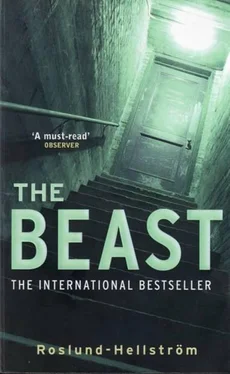‘You should’ve had police protection. You’ll get it. We have a patrol car in place outside your home already. There’s a car downstairs as well. The officer is on his way here to see you.’
Ågestam went to the window. Just then a policeman shut the door to his car and turned to walk towards the front steps of the court building.
The young prosecutor sighed. He felt suddenly very tired, as if the sleep he had missed that night was claiming him now.
‘It’s rather late in the day,’ he said.
‘That’s a fact.’
‘Yes, yes. Too true.’
Grens was still holding the gavel. He swung it, made a sharp noise that bounced off the walls.
He had said what he had come to say, but still gave no sign of leaving and didn’t speak either. Ågestam felt tense. The crippled old bugger simply sat there. What was he waiting for?
‘Are you done? I’m here to work.’
Grens didn’t answer, only smacked his lips irritatingly.
‘Is that a signal? The all-clear?’
‘One other thing. I’ve bought one of those CD players. I put it in my room, next to the tape recorder. I can play that disc of yours now.’
He stayed there, sitting quietly in the judge’s seat. Ågestam got on with his work, trying to muster the arguments that would persuade the media-conscious magistrates that a premeditated murder was simply that, and hence must be judged accordingly, regardless of any other circumstances. He wrote, scribbled out, reformulated. Grens, leaning back and staring at the ceiling, seemed half asleep, only making his presence felt now and then by that maddening noise with his lips.
By half past eight, voices from outside reached them. People were shouting, loudly enough for the sound to get through the double windowpanes.
They both went over to have a look and opened a window, letting in a gust of warm, gentle air. The open place in front of the court was no longer empty. They both started counting; roughly two hundred people had come along. They were facing the main entrance. The crowd was in perpetual motion; it looked like a collection of charged particles with waves of movement going through it, pulsating as people advanced towards the entrance and were pushed back by a line of policemen carrying plastic shields.
People were shouting and waving placards. It was a loud demonstration against the judicial process that was about to start up again in half an hour’s time. These people wanted to show their anger and scorn against a society that couldn’t protect them and yet was prepared to convict a lone citizen who had tried to act in their defence.
Grens and Ågestam exchanged a glance, and Grens shook his head.
‘What do they think they’re doing? As if that bloody racket would make a difference. They’re off their fucking heads. Our boys won’t let them in, threatening behaviour or not.’
A stone flew through the air and hit a policeman at the end of the line. Ågestam shuddered instinctively, suddenly reminded of his house and his car, and of Marina, who perhaps was awake by now. She would see the patrol car, it would surely comfort her. He met Grens’ eyes again and felt he had to explain.
‘They’re scared, nothing more or less. Scared of sex offenders to the point of blind hatred. If a father kills one of them, he’ll naturally become a popular hero. He was the one who did what they’d like to but don’t dare to do.’
Grens snorted.
‘You know what? I’ve got no time for mobs. All my life I’ve gone for them, broken them up. But not all mobs are the same. That man was a hero, they didn’t make him one. He did what we couldn’t. He eliminated a public menace.’
Reinforcements were arriving. The dozen police in front of the court were backed up by another twelve, arriving in two mini-buses. The buses came to a sudden halt when two of the demonstrators walked towards them and the men in full riot gear rushed out to join their colleagues. The wall of men and shields grew more solid.
Slowly the crowd calmed down. It stayed watchful, but the shouting grew less strident and the anger less obvious.
Ågestam closed the window and the room was silent again. He had barely been able to stop himself from jabbing Grens with his elbow. There was something overbearing in the man’s tone of voice, something that irritated him like hell. Why was he always like that? Instead he started to review aloud the arguments he would soon use to the court.
‘I don’t understand this, Grens. How do you mean, a hero who has eliminated a menace?’
‘Steffansson made people feel safer.’
‘He’s a murderer. Lund was a murderer. Two of a kind. The people down there seem to think he shouldn’t be tried at all. Are we meant to regard personal courage as a mitigating circumstance? I don’t think so.’
‘I can only repeat that his action meant protection. Nobody else had given them that.’
It seemed all ordinary people agreed that he had screwed up the case. He ought to think like them.
He did. And he did not.
‘And I repeat that no one has a right to kill, no one. You don’t know me, Grens, and so you can’t work out if, really, at heart, I don’t agree that blowing the head off a sex maniac is a good idea. As it is, I’ll insist that anything short of a lengthy spell in the jug would be a mistake. Society must not send out signals saying anything other than when you kill, you must pay.’
Ågestam went away to order his papers, to clear the floor and the desktop. Grens lingered by the window, watching as the crowd began to disperse. Then he went on to his usual seat at the back of the room, from where he had watched the trial since day one.
The door opened and a porter entered. After him, the journalists streamed in, followed by the members of public who had managed to be at the head of the queue and got past the strict security checkpoint.
The trial of Fredrik Steffansson was on its fifth and last day.
Bengt Söderlund woke early. Two weeks of holiday left. The days were precious now. He had only slept for a few hours every night during the previous week. Only when he kept busy did he have a chance to forget that Elisabeth and the girl had gone and that he didn’t even know where they were. At first he had hardly been off the phone, trying her parents and friends and mates from her old job, but no one had seen her. Once that was clear, he didn’t bother with telling them why he asked. He wouldn’t have any of these buggers laughing at him, no way.
They had agreed to meet at half past nine. He snapped his fingers and Baxter came running to his side. Only a few minutes to go, so he checked at the sitting-room window and there they were, Ove and Helena, Ola and Klas.
They said hello, shook hands, that’s how they’d been greeting each other since they were quite young. That’s how you did it in Tallbacka.
His garden shed was large and easily seen from Flasher-Göran’s windows, so he would see them go inside, and wonder what they were up to. He could stick his wondering up his arse. In the shed Bengt had lined up, end to end, his two tried and trusted sawing-horses, made of long, sturdy planks supported by angled legs. Ove and Klas brought a large plastic sack each, filled with empty glass bottles, in total forty, about half of them for wine, three quarters of a litre capacity, and half for mineral water, 33cc capacity.
They lined up the bottles on the sawing horses and Ove got the lid off the oil drum in the corner behind the lawn mower. It was full to the brim with petrol. He lowered a can under the surface to fill it, watching the bubbles rise. Dribbling petrol as he went, he walked over to the row of bottles, where Helena was waiting with a large plastic funnel in her hand. Ola filled the first bottle to the halfway mark. They moved on to the next bottle; she held the funnel in place, he poured in petrol until the bottle was half full. They carried on like that until all the bottles were done and they had used up over twenty litres of petrol.
Читать дальше













